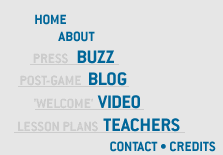LESSON ONE:
Oil Crisis:
Get Into The Game
A global oil crisis has begun. Oil usage worldwide has increased to where the oil supply can only meet 95% of it. Begin the inquiry into the effects of less oil in our lives.

LESSON TWO:
How Bad Can It Get?
Fuel prices rise in anticipation of when actual supplies start to run short. It's clear that there is no quick fix to the shortage. Tensions start to rise.

LESSON THREE:
Life Is Starting To Change
Widespread changes are starting. Goods and services that depended on cheap oil are failing.

LESSON FOUR:
Elasticity and Collapse
This lesson investigates the factors that define elasticity in relation to oil – factors such as lifestyle, geography, setting and community.

LESSON FIVE:
Oil Dependency
Among Nations
The oil crisis has caused some nations to reconsider their foreign policy objectives – and to aggressively seek to acquire oil.

LESSON SIX:
Food Without Oil
The impact of oil on our food supply is one of the most serious aspects of the oil crisis. Shortages are forcing many people to look for locally grown food.

LESSON SEVEN:
Breakdown
Governments have been hit as hard as anyone by the crisis, leading to the existence of red and green zones in cities and refugee camps in the country.

LESSON EIGHT:
Preparation and Community
With problems piling up and the government unable to help, many communities across the nation are turning inward for solutions.

LESSON NINE:
Lessons Learned
Now that the crisis has stabilized, how do we go forward? How do we balance our desire for energy's benefits with the risks and costs of procuring it?

LESSON TEN:
Your World Without Oil
Help out the World Without Oil team. Script and deliver your own citizen report that communicates what is happening to you in the crisis.

In May 2007, over 1,800 people combined imagination with insight to create World Without Oil (WWO), a realistic simulation of the first 32 weeks of a global oil shortage chronicled in 1,500 personal blog posts, videos, images and voicemails. Via these lesson plans, high school teachers can use this collaborative grassroots simulation to engage students with questions about energy use, sustainability, the role energy plays in our economy, culture, worldview and history, and many others.
World Without Oil was an alternate reality game – when submitting their stories, its players pretended the oil crisis was really happening. We encourage teachers to do the same: to get "in game" and act to make the crisis seem real. Each day your students will immerse themselves in an exploration of a World Without Oil, and prepare their own "in-game" stories that they can contribute to the WWO online archive.
Using These Lessons
When planning a World Without Oil unit, consider:
- Modular. Use all ten lessons or select a subset to fit a particular class agenda or schedule.
- Rearrangeable. The game is designed to evoke reactions from its students. Feel free to rearrange the lesson order day to day to match their interests.
- Flexible. We designed lessons to fit in 50-60 minutes (plus after-class reflection time), but feel free to shorten or expand them to fit your course needs.
- Self-Study. Refer students to the Student Page for a lesson (see sidebar on left), and they will have a concise action plan. Here's an Overview to aid self-directed students using the WWO material.
- Evaluations. You can base student evaluations upon group work, personal blogs containing their reflections, class participation, or any other method you determine.
- Customizable. The WWO archive contains citizen reports that cover a vast number of topics. We encourage you to search the archive for player-created stories on topics that fit your course goals. Use the Wayback Machine to see the site on June 1, 2007, the game's last day, and scroll down to the tag cloud.
Lesson Format
Lessons have the following structure:
- Set the Stage – Present one or two stories from WWO to give students the gist of the latest events in the oil crisis.
- Take Action – How will these events change the lives of students, their families, and the world around them? What risks to quality of life do your students see? What will each student personally do in response to these risks? In class or small group discussions, students analyze the causes of the latest events and the potential short and long term effects. They can compare their responses to those of selected WWO players. Directed questions help keep the students on task.
- Lesson Activity - Examine a specific topic that gives context and helps students gain a greater understanding of the forces at work in an oil crisis.
- Reflect - Now armed with a greater understanding of the situation, students react "in game" (as though the latest events were really happening). Students might extend the ideas and relationships underneath the latest events, or examine further the impact and effects. You can have students record these reflections in a variety of media (blog posts, videos, podcasts, photographs, drawings, texts and so on), which you can then submit to the World Without Oil website for eventual inclusion in the WWO archive.
- Take It Further - Although World Without Oil is fiction, it is very closely connected to real-world events, topics and themes. Each lesson includes links to additional material in the WWO archives and other related resources for students to explore between sessions. The idea is to extend the "in-game" point of view beyond the class session, so that students continue to apply its lens of inquiry to their lives and the world around them. They should be encouraged to record the relationships they find in their lives to oil and energy, and report these discoveries in the next class session. We also include links to actual "missions" from WWO, so that students may take on tasks or attempt to solve problems as players in the game did.
Requirements
To use these lesson plans, teachers should have access to the Internet, and the ability to show the class Internet content such as videos. An optimum set-up would be to have an Internet-enabled computer for each small group of students, but you can adapt by copying text and images from blogs, downloading videos, transferring material to local computers, and so on.
Subjects and Methods
The WWO lesson plans are cross-disciplinary and relate to American History, World History, Geography, Current Events, Economics, Government, Humanities, English, and more. Methods include inquiry-based learning, narrative-driven learning, collaborative learning, multimedia content creation, and media literacy. Outcome: an in-depth understanding of the role that energy has played in our economy, culture, policy and identity, its connections to our lifestyle and affluence, and ways to evaluate its role in our future.
Educational Standards
The lesson plans are tailored to cover topics deemed important to educational standards. We've listed suggested McREL standards pertaining to each lesson (see the lesson's left sidebar). We've also compiled a list of state standards for California, Florida, Illinois, Massachusetts, New York, and Texas (and many other states by extension).
Suggestion: Blog
Each lesson asks students to reflect upon the day’s theme. Blogs are well-suited to this activity: students can prepare reflections as text, images, videos or audiofiles and upload them to an individual, group or class blog. Blogging echoes the way in which the participants in the original game shared their ideas.
Blogs are available for free from LiveJournal, Vox, WordPress, Edublogs, Blogspot, Ning and many other blog hosts. You can have students establish their own blogs (most require an e-mail address) or set up blogs for your students through the school district, a learning management system (e.g. Moodle, Blackboard), or one of the free services that allows teachers to manage student blogs (e.g. Edublogs, Ning). A central blog can use the "blogroll" feature to link all the blogs and share ideas.
Teachers should refer to their district’s Internet use policies to help determine the best blog option, and determine if any restrictions apply to students publishing materials online.
Upon completion of the lessons, we encourage teachers and students to submit the material's URL, using the "Tell Your Story" form, for eventual inclusion in the WWO site archive.
Credits
Lesson plans by Dan McDowell and Ken Eklund
Reviewed by Cari Ladd
Your comment welcome: see our Contact page
![]()
![]()
![]()
![]()
![]()
![]()
![]()
![]()
![]()
![]()






